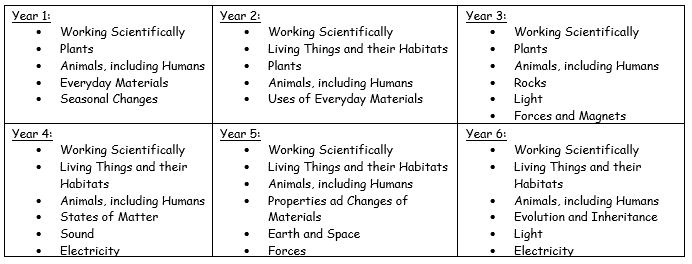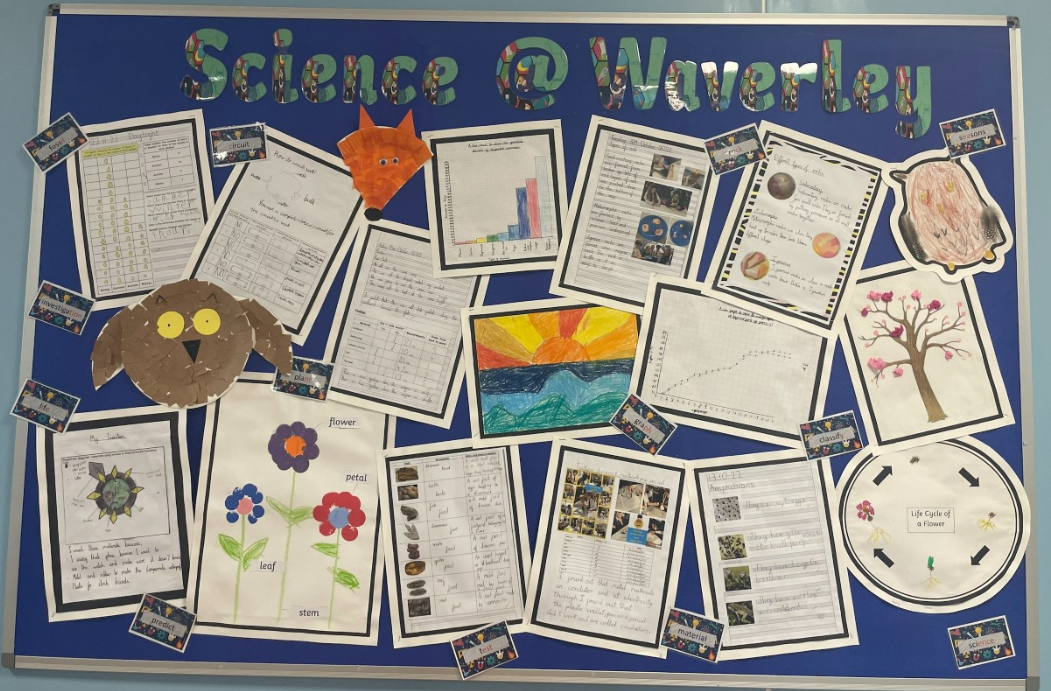Science
At Waverley Junior Academy we aim for all children to develop the key skills and scientific knowledge they need through encouraging our pupils to raise questions and investigate the world in which they live. Science teaches an understanding of natural phenomena, it stimulates an inquisitiveness in finding out why things happen in the way they do and it develops methods of enquiry and investigation to inspire creative thought. Children learn to ask scientific questions and begin to appreciate the way in which Science will affect the future on a personal, national and global level.
Intent
The WJA Science curriculum allows our children to develop curiosity, perseverance and an ability to challenge what we know about the world. We aim to make Science as practical as possible, linking to real life contexts and giving a meaning to our learning. Our intent is to give every child a broad and balanced Science curriculum which enables them to confidently explore and discover what is around them, so that they have a deeper understanding of the world we live in. We want our children to love Science. We want them to have no limits to what their ambitions are and grow up knowing they can be astronauts, forensic scientists, toxicologists or microbiologists. We want our children to remember their Science lessons in our school, to cherish these memories and embrace the scientific opportunities they are presented with.
Implementation
To achieve our curriculum goals, we provide exciting, practical hands on experiences that encourage curiosity and questioning. Through these stimulating and challenging experiences we support every child secure and extend their scientific knowledge and vocabulary. At WJA, we have a coherently planned and sequenced curriculum which has been carefully designed and developed with the needs of our children and our community at the centre.
- At WJA, Science topics are taught within each year group in accordance with the National Curriculum.
- Topics are blocked to allow children to study each one in depth.
- Each year group builds upon the learning from prior year groups therefore ensuring depth of understanding and progression of skills.
- Children explore, question, predict, plan, investigate and observe as well as conclude their findings.
- Children present their learning using Science specific language and diagrams.
- Regular opportunities to review the learning taken place in previous topics as well as previous lessons supports the children in their ability to ‘know more and remember more’.
- Teachers access a range of resources, planning and effective CPD opportunities
- Educational visits and visitors to the academy are planned, to enrich and enhance the pupils’ learning experiences.
- Cross-curricular activities with other subjects such as Maths, English and computing support the schools’ key driver of children making links between their learning.
Areas of the National Curriculum

Impact
The impact of our curriculum design is that children will make outstanding progress over time, relative to their individual starting point and their progression of skills. Children will leave WJA reaching at least age related expectations for Science. Through various workshops, trips and interactions with experts our Science curriculum will lead pupils to be enthusiastic Science learners and understand that Science has changed our lives and that it is vital to the world’s future prosperity. We will empower our children so they understand they have the capability to change the world. This is evidenced in a range of ways; pupil voice, childrens’ work and their overwhelming enjoyment for science.
At WJA we encourage our pupils to love reading. Reading develops curiosity and exploration which are skills that run throughout our Science curriculum. Here are some examples of some texts that are used in each year group, using reading as a creative catalyst for Science lessons.
Literacy in Science
Throughout Science tasks, we ensure all children show respect for each other. They listen to ideas presented and are confident to express and share their opinions through the medium of class discussion.

Foundations@Waverley (F@W)
Science in the Early Years Foundation Stage is taught through the ‘Understanding the World’ strand. Children find out about materials, forces, seasons and living things by investigating and using their senses. They discuss similarities, differences, patterns and change.
Through continuous provision and adult led activities children are motivated to ask questions about why things happen and how things work. They are encouraged to explore the world around them and to care for living things.
The key skills in F@W curriculum goals and the focus on communicating effectively and developing new language and vocabulary ensures our pupils are prepared for the next stage of their education.
More information can be found on the Foundations@Waverley page.
Supporting documents
Please click here to download the National Curriculum Science Programmes of Study
Please click here to see the WJA Long Term Plan
Science Events
Each Year our pupils attend educational visits to bring their Science learning to life. These days are important as they support pupils to deepen their learning and understand Science in the ‘real world’. The Waverley children always return from their visits inspired and motivated to learn more
Each year we celebrate a number of different events;
- British science week
- Earth Day
- International Women in engineering day
- Sun awareness week
- Big schools birdwatch
- Ada Lovelace Day
- World Space week
Useful links
Here are some useful links that can be accessed at home. Reach out reporter as it has a section which includes weekly updates and videos about science related subjects. Perfect for those children who love to find out facts!
If you have any questions about how Science is taught within school or how to further support your children at home please do not hesitate to contact Miss Taylor (Science Lead).